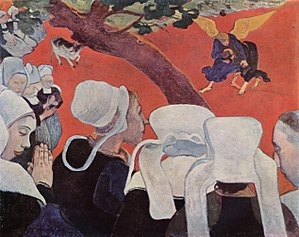
I've spent the last few days at the Eternal God – Eternal Life conference at the University of Aberdeen. Various scholarly papers ranging from analytic philosophy to bio-ethics and technology to systematic theology, were the primary forms of delivery and discussion. The quality and accessibility was likewise varied and I guess we all have our preferences, personal interests, prevailing presuppositions and particular expectations. But it was the standout paper which set my interest alight. I've heard many a lecture in my time and a very few of them have made a permanent place in the memory as perspective changing and truly transformative of a subject area. This lecture was one of these.
This morning Professor Katherine Sonderegger from Virginia Theological Seminary spoke "Toward a Theology of Resurrection". From the first sentences of reflection on Hopkins' poem God's Grandeur we were in the hands of a theologian whose roots go deep down into the soil and compost of the Christian tradition, and produces food for thought that is edible, assimilable, nourishing and plentiful. This was a magnificent lecture on creation, human life and longing, and the good God who has set eternity in human hearts, and created a hunger for God and righteousness that makes the heart restless and incomplete. Indeed the idea that heaven may be a place of comprehensive fulfilment, completed perfection, speaks of a stasis and fixity that does no justice to our creatureliness, or to the Creator's overflowing purposefulness, and would lead to a creation that would become a "finished futility", my words taken from P T Forsyth.
For a large part of the paper Sonderegger explored the nature of love and longing, of relatedness and connection, and of our lived experience on earth of broken connection, relations gone wrong, a view of the world, people and other creatures as functional and utilitarian that is ultimately reductionist of what it means to be God's creature with eternity in our hearts. The coming of God in Christ, and the forward thrust of reconciliation and redemption through cross and resurrection, point us towards a different kind of ressurected reality when what will be fulfilled will be our capacity for relatedness, a completion that is organic and dynamic, in which growth is part of the completeness of the creature, eternally frowing into the life and fellowship with all that is which we might call eternal life.
It is very difficult to convey the passionate thoughtfulness, biblical erudition, theological confidence rooted in intellectual humility, all of which informed and shaped this paper. At some stage this paper will be published, and when it is I will make it known here. Meantime I am grateful for the privilege of having heard a theologian articulate and enrich the Christian understanding of the new thing that God is and will do in Jesus Christ. Eschatology is too often esoteric in conceptuality, speculative in exposition and analytic in its preoccupation with metaphysics, epistemology and over-rationalised curiosities. This was a lesson in theology that is dogmatically constructive, imaginative and visionary, biblical in parameters and pastoral in orientation. I can easily take much of what she was saying and build deep gospel responses to those who are bereaved, dying, or suffering the deep sense of bewildered anxieties generated by our self-contained culture with its limited and limiting worldview.

